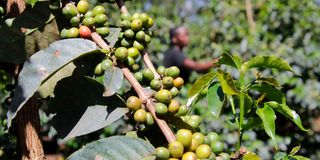Coffee farmers appeal to DP as prices drop 50pc

A farmer tends to her coffee in Nyeri town on October 25, 2022.
Coffee farmers have suffered a hit on their earnings as payments by cooperative societies and factories drop by up to 50 per cent.
Farmers have been smiling to the bank for the past three years, as the multi-million-shilling sector recorded a windfall that saw them pocket on average Sh100 per kilogramme of coffee delivered to their respective factories.
So promising was the sector that farmers who had abandoned their plantations began cultivating the crop, and coffee mills that had been closed began roaring again.
Moreover, Deputy President Rigathi Gachagua’s initiation of coffee sector reforms stirred farmers’ confidence of a return to the good old days when they were financially independent.
Currently, factories have released a payout rate of between Sh50 and Sh90 per kilogramme on average, a drop of between 50 per cent and 11 per cent, citing poor market prices at both the auction and direct sales as well as harsh weather conditions occasioned by drought that affected flowering and berry formation.
“Prices were not impressive from when the market was opened, which was a consequence of a rebound in production in Brazil which is the world’s largest producer,” said Mr Anthony Macharia, manager at Barichu Farmers’ Cooperative Society.
The sentiments are echoed by most coffee cooperative societies representatives in Nyeri, Kirinyaga, Murang’a and Embu counties.
Barichu Cooperative has four factories and has paid farmers Sh80 on average compared to Sh110 per kilogramme paid last year and Sh100 in the preceding year.
The management of the factory said there was a lot of harvest of the early crop which produces inferior berries compared to the main crop that is picked from October through the end of January.
Early crop is picked between April and June, but changing weather patterns have altered the coffee calendar, with farmers picking the crop throughout the year.
“This really affected the quality of beans they harvested because we had more volumes of the early crop that accounted for over 50 per cent of our total sales. The early crop produced a lot of Grade C which is poor quality and we believe it contributed to the poor prices our coffee fetched,” he added.
Further, the coffee berries suffered from drought, which affected formation and consequently the quality of the beans.
Mr Macharia said while there was high demand for Kenyan coffee, the markets paid poorly for their produce, including the premium grades.
At the Nairobi Coffee Exchange (NCE), farmers received about Sh547.6 ($4) per kilogram of clean coffee compared to Sh933.6 ($8) paid last year for the same quantity (Exchange rate was at 116.7).
Besides the auction, they also sell their coffee to Starbucks through a marketing agent. Compared to last year where they bought a 50-kg bag of parchment at over Sh54,000 ($470), they paid Sh47,915 ($350) for the same quantity.
The direct sales absorbed only five per cent of their coffee compared to 75 per cent that they previously purchased.
“Were it not for the current dollar exchange rate, it could have been worse. Selling directly allows us to negotiate for higher prices,” noted Mr Macharia.
Last year, farmers from the four factories under Barichu cooperative – Karatina, Gatomboya, Karindundu and Gaturiri received Sh499 million compared to this year’s Sh345 million.
Kiawamururu factory in Mukurwe-ini paid farmers at Sh83.10 per kilo, a drop from Sh109 per kilo paid to them last year.
“What saved us was the coffee we had picked between October to the end of the year which we sold to an oversea buyer. Otherwise the price would have been much lower because the quality was poor due to the weather,” said Mr Charles Karinga, chairman of the factory.
The German buyer offered the highest price during the period at Sh55,767.70 ($415) per 50kg of parchment for premium grade AA, and Sh52,408.20 ($390) for grade AB of the same quantity.
Also Read: New coffee payment system nears fruition
Prices at the Nairobi Coffee Exchange (NCE) were poor where premium grades AA and AB fetched around Sh30,907.40 ($230) per 50kg bag while the lowest prices offered to some other grades of coffee was Sh17, 469.40 ($130) for the same quantity.
“The government announced a crackdown on coffee cartels… we think there is some hoarding taking place so that brokers can have enough stash before the government begins its intervention in the sector,” he said.
In March this year, DP Gachagua assured farmers that the government was establishing a minimum price for their coffee to ensure they have better returns, saying they were in contact with Ethiopian farmers with a view of adopting their payment model.
He also vowed to rid the sector of “the five brokers who control the coffee market and manipulate prices.”
“Once we find a market for our coffee, farmers will not deal with brokers anymore. We will establish godowns where buyers will buy directly from the farmers,” he said in an earlier interview.
Although the prices were poor, the price per cup of coffee in the importing country has remained the same, making farmers point fingers at the millers and marketers.
Gatura factory paid farmers Sh50.20 per kilo compared to Sh80 they received last year owing to poor quality of coffee they delivered and sold.
The chairman of the factory, Mr Charles Njure, said farmers were selling half their produce to the factory and the remainder to hawkers who buy at Sh40 per kilo, farm gate price.
At Kibirigwi Coffee Cooperative Society, Mr Samson Muriuki, the chairman managing eight factories, said the farmers will be receiving between Sh60 and Sh80 for their produce, citing surplus of the commodity in the market, adding that cooperatives’ lack of financial capacity to expand derails them.




